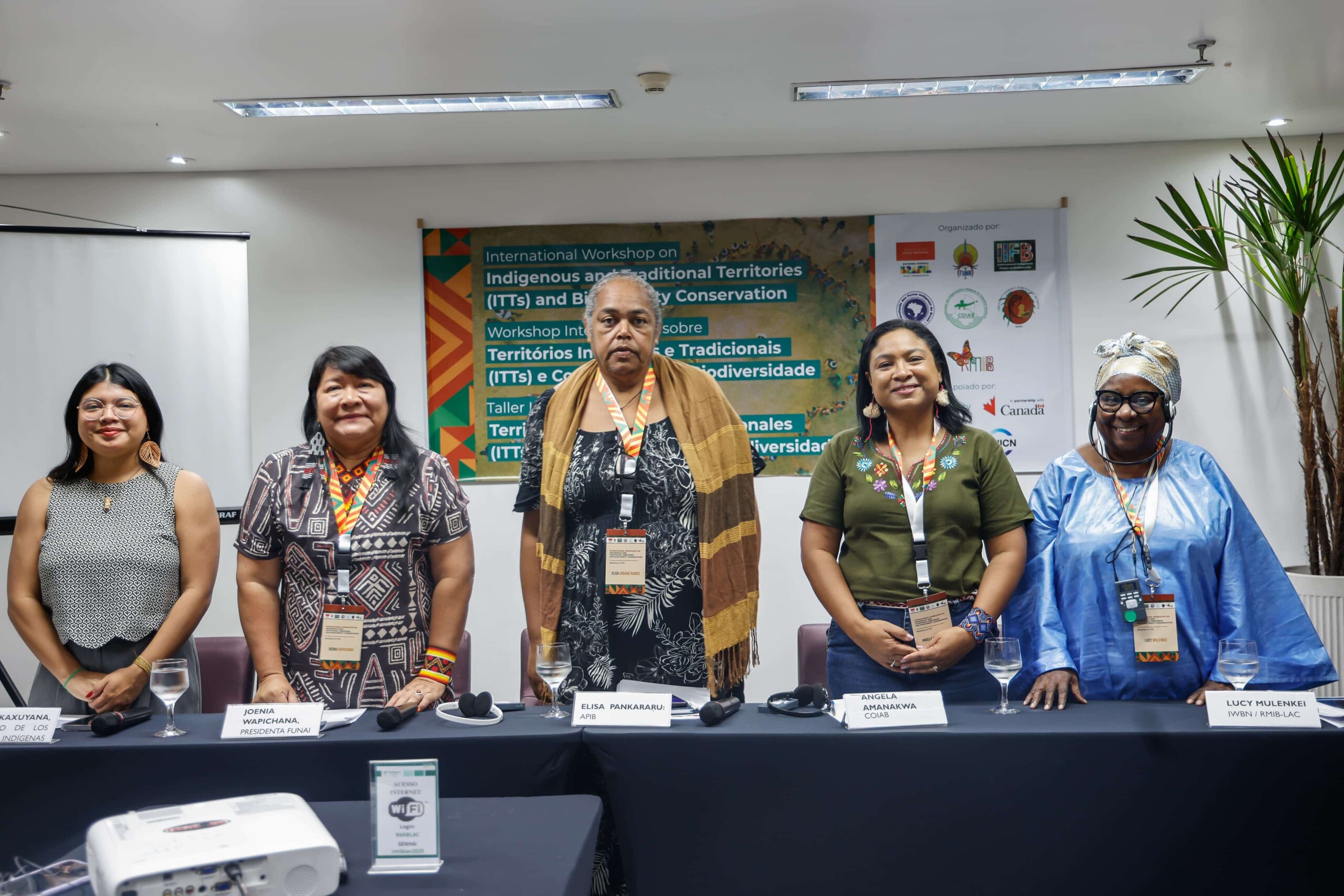The International Workshop on Indigenous and Traditional Territories (ITTs) is underway in Manaus, Brazil, bringing together Indigenous leaders and experts from 21 countries. Over four days, participants are debating the vital role of ITTs in biodiversity conservation, restoration, and climate action and shaping key recommendations for upcoming global negotiations
Manaus, Brazil – September 3, 2025 – The International Workshop on Indigenous and Traditional Territories (ITTs) and Biodiversity Conservation, which began yesterday, is in full swing in Manaus. The event, organized by the International Indigenous Forum on Biodiversity (IIFB), the Ministry of Indigenous Peoples (MPI) of Brasil, the National Foundation of Indigenous Peoples (FUNAI), the Articulation of the Indigenous Peoples of Brazil (APIB), and the Coordination of Indigenous Organizations of the Brazilian Amazon (COIAB), is bringing together 60 Indigenous experts from 21 countries until September 5. This week, participants will exchange knowledge and experiences on the contributions of Indigenous and Traditional Territories (ITTs) to conservation, ecosystem restoration, and climate action.
“Our lands and territories are the foundation of our lives and economies. Today, from Manaus, we are beginning a workshop to forge strong recommendations that we will present directly to the first meeting of the Subsidiary Body on Article 8(j) of the Convention on Biological Diversity. I am confident that this week will allow us to lay the groundwork for our territories to be recognized as essential pillars for biodiversity conservation and to reduce the impacts of Climate Change.”
Lucy Mulenkei Co-Chair, IIFB
A Milestone for Biodiversity and Indigenous Peoples and Local Communities
The workshop’s location in Brazil, the host country of the upcoming UNFCCC COP30, is a strategic and symbolic act in the heart of the Amazon. This meeting seeks to recognize ITTs as a primary pathway for achieving the 30/30 ambition in accordance with Target 3 of the Kunming-Montreal Global Biodiversity Framework, which is distinct from Protected Areas and Other Effective area-based Conservation Measures (OECMs). ITTs are fundamental for conservation, as their governance systems and traditional knowledge sustain biodiversity, strengthen resilience, and contribute directly to climate action.
Inaugural Day: A Summary of the First Day
The opening day began with a traditional ceremony that honored ancestral customs. Participants received welcoming remarks from the Minister of Indigenous Peoples, Sonia Guajajara, and the President of FUNAI, Joenia Wapichana, Elisa Pankararu of APIB and Angela Amanakwa Kaxuyana of COIAB, with Lucy Mulenkey and Ramiro Batzin, both Co-chairs of IIFB.
The first discussion panels then focused on the contributions of Indigenous and Traditional Territories (ITTs) to biodiversity conservation and the role of Indigenous Peoples and local communities in biodiversity restoration. Participants from the seven sociocultural regions of the world met in working groups to share experiences and formulate the first recommendations. The inaugural day concluded with a plenary session where the results of the discussions were presented.
Next Steps: Key Panels and Discussions
Over the next few days, the workshop will address fundamental topics in a series of discussion panels that include: Panel 3: Contribution of Indigenous lands and territories to climate action; Panel 4: Traditional land and resource use in territorial planning processes; Panel 5: Modus operandi of the Subsidiary Body on Article 8(j); Panel 6: Process to review and update the Voluntary Glossary of Key Terms; Panel 7: Global report on collective progress in the implementation of the Kunming-Montreal Global Biodiversity Framework; Panel 8: Strategies for mobilizing resources for the implementation of the Global Biodiversity Framework and the traditional knowledge program of work.
Upon the conclusion of the workshop on September 5, participants will have consolidated a set of key recommendations. These will be presented at high-level events such as the first meeting of the Subsidiary Body on Article 8(j) (SB8J-1) in Panama (October 2025), the IUCN World Conservation Congress in Abu Dhabi (October 2025), and the UNFCCC COP30 in Belém (November 2025), which may later be included in the CBD COP17 to be held in Yerevan, Armenia, in October 2026. This conference will be crucial for evaluating the progress and implementation of the Kunming-Montreal Global Biodiversity Framework.
“Biodiversity is one of those precious resources of which Indigenous Peoples have been vigilant and guardians, thus benefiting the entire planet.”
Joenia Wapichana / President of FUNAI
Collaborators and Supporters
The ITT Workshop has been made possible thanks to the valuable support of the Tenure Facility, Global Affairs Canada (GAC) and the Podong Inidgenous Peoples Initiative of the IUCN- IIFB.






























